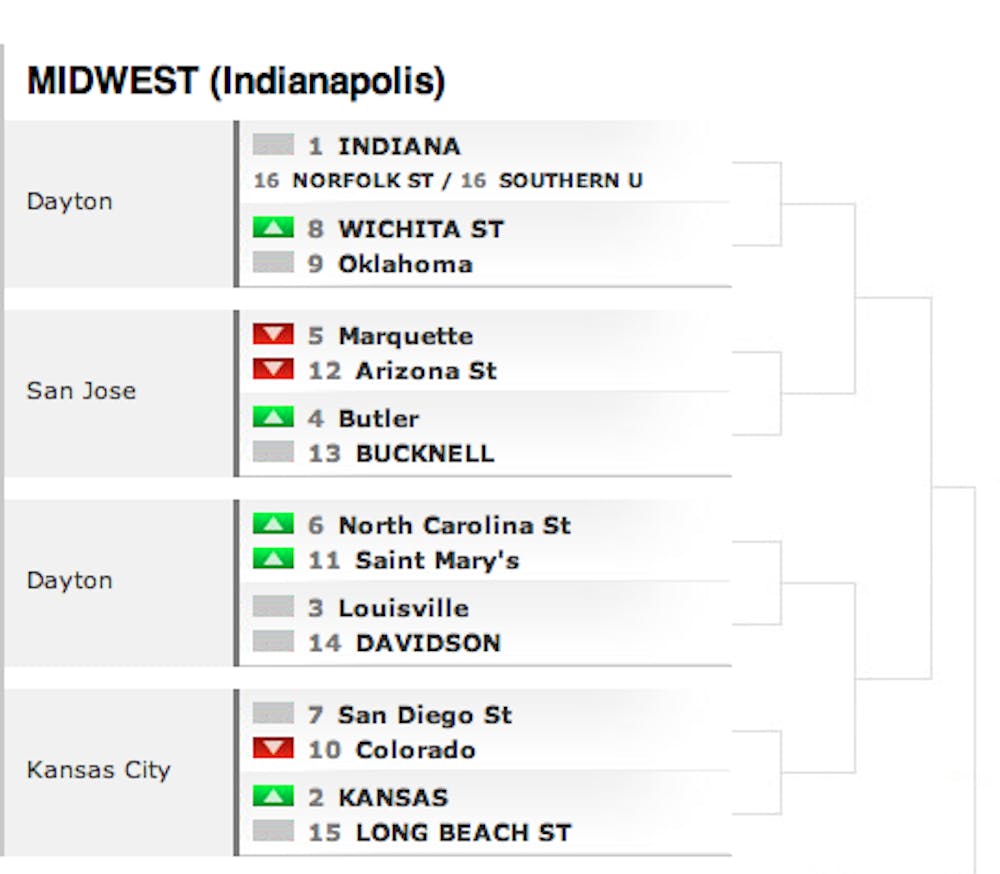It’s almost that time of year again. March madness is almost here. Millions of people will be filling out brackets both by hand and online submitting them into pools of friends and offices alike in hopes of obtaining the perfect bracket. The strategies to picking which teams will win are numerous. Some people will put their favorite team all the way through while others may pick their favorite mascots or just go with their gut. However, there is a science that will help you choose the next George Mason, VCU, or Butler. It’s called bracketology, which may help you win it all in March, but in order to better understand bracketology, one must first understand how the bracket is decided upon.
 The Indianapolis region of the NCAA tournament bracket where ASU currently sits as a number 12 seed according to ESPN resident Bracketologist Joe Lunardi. Photo courtesy of ESPN
The Indianapolis region of the NCAA tournament bracket where ASU currently sits as a number 12 seed according to ESPN resident Bracketologist Joe Lunardi. Photo courtesy of ESPNTen committee members from schools around the country convene over five days each March to decide the field of 68. They consider the team’s RPI (ratings percentage index), which is computed as a combination of the team’s winning percentage, their opponent’s winning percentage and their opponent’s opponent’s winning percentage. The committee takes into account the team’s record against those teams in division one that have an RPI between one and 50, and those teams whose RPI is greater than 150. The bracket is made up of 31 automatic qualifying schools who win their conference tournaments and 37 at-large bids up for grabs. Once the teams are decided on they are ranked one through 68 and put into one of four respective regions made of 16 teams each.
Before you get all excited, picking the perfect bracket is next to impossible. Out of 6.45 million brackets submitted to ESPN’s bracket challenge last March, no one was perfect after the first found of 32 games. In fact, the best record was only 30-2. According to the Yale University department of statistics, you are 60 billion times more likely to win the Powerball jackpot.
So here are some tips that may tip the odds in your favor. Look at the name of the team’s coach. Prior to this past year, a coach whose first name is Bill or Jim or whose last name is Williams has won the national title every year since 2002. Number one seeds usually win it all followed by three seeds and then two seeds. Syracuse and Duke are the only two private universities to win in the past ten years so when in doubt pick the public school.
When it comes to seeding, a number-one seeded team has never lost in the round of 64 and a team seeded worse than 12th has only made it to the elite eight one time. So as bas as you want that Cinderella team to make it all the way and be the one bracket buster, it’s better to play on the safer side. Make sure to vary the seeding of the final four. Four number-one seeds have only made it to the tournament once, and that was in 2008.
What about the upsets? The nine seed beats the eight seed more often, but the nine seed doesn’t win too often in the second round since they have to play the number-one seed. The five seed and twelve seed match-up is talked about a lot, but if you’re looking to win the pool, only one twelve seed generally wins every year so you’re better off picking all the favorites than taking one on the chin trying to pick an upset.
Will you be singing “One Shining Moment” this March when your bracket wins? Most likely not, but don’t let that stop you from experiencing one of the most unique sporting events this country has to offer. So fill out your bracket with those tips in mind and follow my best tip — don’t overthink it. Fill out a lot of brackets for your best chance and go with your gut. If you’re wrong, you still got to procrastinate by watching a lot of college basketball during the workday or in class when you probably weren’t supposed to. If you do win, congratulations because as you can see, you certainly beat the odds.
If you have any suggestions as to what you would like to see me write about or cover this semester, have a comment about a recent post, or simply want to talk sports, contact me at nkruege1@asu.edu or via Twitter @npkrueger




